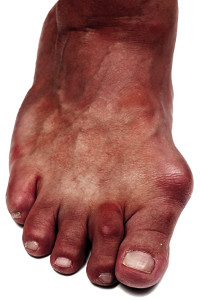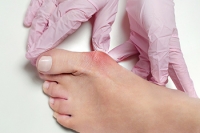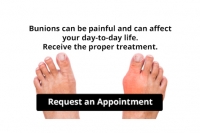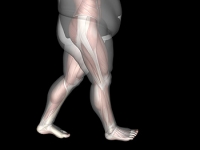 If you enjoy walking and exercising, the pain of a bunion may cause considerable interference in your enjoyment of these activities. They most commonly form at the base and side of the big toe, and could become worse by wearing shoes that do not fit properly. These types of shoes include those that have a narrow toe area, which does not have adequate room for the toes to move about in. When the bunion begins to form, the majority of shoes do not have ample room to accommodate the bony protrusion, and this may result in pain and stiffness emanating from the joint and surrounding areas. There are several ways to properly treat a bunion, and it typically begins with wearing the correct shoes that may eliminate painful pressure on the toe. If you feel you have developed a bunion, it’s suggested to consult with a podiatrist so the correct course of treatment can commence.
If you enjoy walking and exercising, the pain of a bunion may cause considerable interference in your enjoyment of these activities. They most commonly form at the base and side of the big toe, and could become worse by wearing shoes that do not fit properly. These types of shoes include those that have a narrow toe area, which does not have adequate room for the toes to move about in. When the bunion begins to form, the majority of shoes do not have ample room to accommodate the bony protrusion, and this may result in pain and stiffness emanating from the joint and surrounding areas. There are several ways to properly treat a bunion, and it typically begins with wearing the correct shoes that may eliminate painful pressure on the toe. If you feel you have developed a bunion, it’s suggested to consult with a podiatrist so the correct course of treatment can commence.
If you are suffering from bunion pain, contact Brent Harwood, DPM of Southeast Podiatry. Our doctor can provide the care you need to keep you pain-free and on your feet.
What Is a Bunion?
Bunions are painful bony bumps that usually develop on the inside of the foot at the joint of the big toe. As the deformity increases over time, it may become painful to walk and wear shoes. Women are more likely to exacerbate existing bunions since they often wear tight, narrow shoes that shift their toes together. Bunion pain can be relieved by wearing wider shoes with enough room for the toes.
Causes
- Genetics – some people inherit feet that are more prone to bunion development
- Inflammatory Conditions - rheumatoid arthritis and polio may cause bunion development
Symptoms
- Redness and inflammation
- Pain and tenderness
- Callus or corns on the bump
- Restricted motion in the big toe
In order to diagnose your bunion, your podiatrist may ask about your medical history, symptoms, and general health. Your doctor might also order an x-ray to take a closer look at your feet. Nonsurgical treatment options include orthotics, padding, icing, changes in footwear, and medication. If nonsurgical treatments don’t alleviate your bunion pain, surgery may be necessary.
If you have any questions, please feel free to contact one of our offices located in Fairhope, Brewton, and Atmore, AL . We offer the newest diagnostic and treatment technologies for all your foot care needs.
Read more about Bunions







